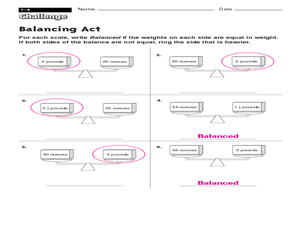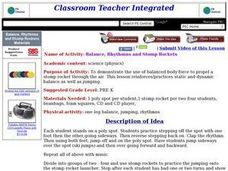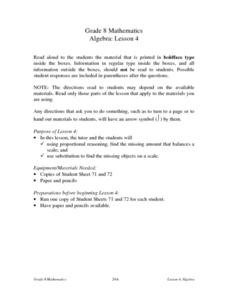Curated OER
All in the Balance
Students investigate gravity and balance. In this balance instructional activity, students listen to the story Mirette on the High Wire by Emily Arnold McCully. They experiment with balance by creating a tag board model figure that...
Curated OER
Balancing Act
Young scholars describe how balance is important in their daily lives. In this balance activity, students read Mirette on the High Wire, discuss how the book relates to the concept of balance and complete two balancing...
Curated OER
Tin Can Stilt Walkers
Students make tin can stilt walkers. In this stilt walkers activity, students use 48 ounce size cans to make stilt walkers. They practice walking on them to improve their balance in this environmentally friendly art and physical...
Curated OER
Using a Balance to Compare Weights
In this using a balance to compare weights worksheet, 3rd graders compare two weights in pounds and ounces, write "balanced" if they are equal or circle the one that is heavier if they are not equal.
Curated OER
Student Exploration: Weight and Mass
In this student exploration-weight and mass worksheet, student use the Weight and Mass Gizmo to answer questions and fill in charts with estimating and measuring.
Curated OER
Logical Problem Solving
In this logical problem solving worksheet, 7th graders solve and complete 4 different types of problems. First, they fill in the boxes for each balance problem. Then, students state whether each statement given is true or false and give...
Curated OER
Balancing Act
Students demonstrate management skills specific to balance. In this physical education lesson students participate in activities with and without apparatus to improve balance. Students work at 8 stations to practice skills needed for...
Curated OER
What Instruments Do You See?
In this scientific instruments worksheet, students are given photographs and titles of four instruments used in measurements. They answer five questions about the instruments used to measure specific items and the unit of measurement for...
Curated OER
Where do Plants Get their Food?
In this where do plants get their food worksheet, students design an experiment that will disprove the idea that plants obtain their food from soil. Students will set up their experiment and design a data table that will record data over...
Curated OER
Mathematics Applications
In this annual percentage rate learning exercise, 10th graders solve 4 different word problems that relate to determining the interest rate and balance due for each problem. They solve each problem using an annual percentage table when...
Curated OER
Math Applications 11
For this loans and interest charges worksheet, students solve 3 different word problems, each with 2 or more parts to them. First, they determine how many dollars need to be invested in order to provide a child with enough for college....
Curated OER
Balancing Chemical Equations
In this chemistry worksheet, students balance each of the equations listed on the sheet. There are twenty-one equations to solve and complete.
Curated OER
Whole Numbers Problems
In this math worksheet, students solve 40 word problems involving the basic operations of addition, subtraction, multiplication, and division.
Curated OER
Importance of the Ear
In this biology worksheet, students identify six important reasons of the ears in humans. They complete a graphic organizer filling in each of 6 circles with one reason of importance.
Curated OER
Music: Dancing a Jig
Students Watch a video to observe Celtic dancers prior to playing a game called, "Irish Jig Tag." When students are tagged with a Shamrock wand, they mimic an Irish jig. The game can be adapted to celebrate other nationalities or...
Curated OER
Balancing the Budget
Students identify the different components that make up the federal budget. They discuss the relationship between government revenues and spending and between budget deficits and the national debt. Students predict how changes in...
Curated OER
Balance Stations
Students are introduced to the concept of balance. In groups, they travel between eight stations in which they balance their own body and different types of balls. To end the lesson, they share which one was the hardest and the easiest.
Curated OER
Balance, Rhythmns and Stomp Rockets
Students practice stepping and jumping, using specified foot action, in rhythm. In groups, they practice jumping onto stomp rocket launchers and demonstrate how to increase the distance by raising the angle of the launcher. After each...
Curated OER
Stay Fit, 'Cause You Never Know.
Students identify what "Active Living" means and compare and contrast the relationship between fitness and active living by developing a recipe for Active Living. They examine Canada's Food Guide to Healthy Eating and the importance of...
Curated OER
Measuring and Comparing Mass With a Balance
Fifth graders observe and demonstrate measuring and comparing mass using a balance. They discuss the definition of mass and the units of measurement used, observe how a balance is used, and with a partner balance the baskets of the...
Curated OER
Algebra: Lesson 4
Eighth graders participate in using algebraic proportional reasoning to find the missing amount that balances on a scale. Substitution is used to discover the missing objects on a scale. They answer multiple choice questions that are...
Curated OER
The Shapes Balancing Act
Young scholars comprehend the concept of balance, specifically the terms "base of support" and "center of gravity". They review the different basic shapes: triangle, circle, square, line, point, and rectangle. Students discuss how we...
Curated OER
Introduction to the Principles of Design & Balance
Learners explore the relationship of the principles of design to the elements and also the principle of balance. They demonstrate knowledge of fashion strategies. Students distinguish between line, texture, color, shape/form and patterns.
Curated OER
Seesaws
Students make direct comparisons between objects using balance and spring scales. They also are encouraged to estimate which object is heavier by holding the objects before using the balance scales. Comparing the masses of objects is the...

























